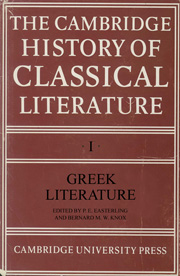Book contents
- Frontmatter
- 1 Books and readers in the Greek world
- 2 Homer
- 3 Hesiod
- 4 The epic tradition after Homer and Hesiod
- 5 Elegy and iambus
- 6 Archaic choral lyric
- 7 Monody
- 8 Choral lyric in the fifth century
- 9 Early Greek philosophy
- 10 Tragedy
- 11 The satyr play
- 12 Comedy
- 13 Historiography
- 14 Sophists and physicians of the Greek enlightenment
- 15 Plato and the Socratic work of Xenophon
- 16 Oratory
- 17 Aristotle
- 18 Hellenistic poetry
- 19 Post-Aristotelian philosophy
- 20 The literature of the Empire
- 21 Epilogue
- Appendix of authors and works
- Metrical appendix
- Works Cited in the Text
15 - Plato and the Socratic work of Xenophon
Published online by Cambridge University Press: 28 March 2008
- Frontmatter
- 1 Books and readers in the Greek world
- 2 Homer
- 3 Hesiod
- 4 The epic tradition after Homer and Hesiod
- 5 Elegy and iambus
- 6 Archaic choral lyric
- 7 Monody
- 8 Choral lyric in the fifth century
- 9 Early Greek philosophy
- 10 Tragedy
- 11 The satyr play
- 12 Comedy
- 13 Historiography
- 14 Sophists and physicians of the Greek enlightenment
- 15 Plato and the Socratic work of Xenophon
- 16 Oratory
- 17 Aristotle
- 18 Hellenistic poetry
- 19 Post-Aristotelian philosophy
- 20 The literature of the Empire
- 21 Epilogue
- Appendix of authors and works
- Metrical appendix
- Works Cited in the Text
Summary
XENOPHON
The striking and unusual personality of Socrates attracted much attention among the Athenians of the later fifth century, and brought him many admirers. But his influence was exerted by his conversation, not by any writing, so that posterity knew him only through the literature that sprang up, as enemies attacked him and friends attempted, often using dialogue form, to present the man they had known. Of this literature the work of Plato and Xenophon is all that survives, apart from some fragments of Aeschines of Sphettus. Plato, it is certain, made Socrates express philosophic views he never held; at times he became Plato's mouthpiece. Xenophon's Socrates, on the other hand, is hardly a philosopher at all; he gives good practical advice and sets an inspiring example of personal conduct. Plato and Xenophon may have developed different sides of their hero; but, unlike Plato, Xenophon was unable to paint a portrait that could explain the fascination which he had undoubtedly exerted.
There is nothing to show that the young Xenophon knew Socrates well before he joined the expedition of Cyrus in 401. Nor can it be said when he began to write of him; presumably this was not before returning to Greece in 394. His first contribution to Socratic literature was Socrates' defence (Apology). Earlier writers, he says, agreed that at his trial (399 B.C.) Socrates took a high or haughty line, but they failed to explain that he did this to secure his own conviction, knowing that death was better than the deterioration that age must bring.
- Type
- Chapter
- Information
- The Cambridge History of Classical Literature , pp. 478 - 497Publisher: Cambridge University PressPrint publication year: 1985
- 2
- Cited by



